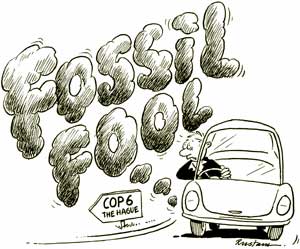 "Preventing climate change is not just
an economic or an environmental issue. It is above all a moral and ethical issue.
When will one tonne of carbon dioxide equal to another tonne of carbon dioxide? Is one
tonne of a greenhouse gas produced by a New Yorker or a Londoner equal to a tonne of the
same gas produced by a peasant in Guatemala, Chad or Bangladesh?
"Preventing climate change is not just
an economic or an environmental issue. It is above all a moral and ethical issue.
When will one tonne of carbon dioxide equal to another tonne of carbon dioxide? Is one
tonne of a greenhouse gas produced by a New Yorker or a Londoner equal to a tonne of the
same gas produced by a peasant in Guatemala, Chad or Bangladesh?The simple moral answer
is ‘no’. The first tonne is the result of luxury. The second tonne is the result
of basic survival. Both of them go into the atmosphere. One needs to be controlled and the
other needs to be supported."
Equity Watch, November 15, 2000, a newsletter brought out by CSE at
the COP6,
Climate Change talks held in the Hague, Netherlands



"What we can do when the leaders of poor nations have the minds of
beggars. We would like to tell the Indian delegation that not only was the
stand-in minister, Suresh Prabhu, lacklusture and predictable, but we really don’t
see any reason for him to be here at all.The French president, on the other hand, did a
better job of putting commitment and concern on the table on how we can find effective and
equitable way of meeting the climate challenge. Reject the note Mr Prabhu or don’t
come home."
Equity Watch, November 24, 2000, a newsletter brought out by CSE at
the COP6,
Climate Change talks held in the Hague, Netherlands



"When it comes to pollution control, it is only the hammer of the Supreme
Court that seems to push government to do anything. Without creating a
crisis, first for the auto-industry last year and now for the government, it seems that no
action gets taken. Almost , as if the government has abdicated its responsibilities, for
pollution control and public health. It is truly a murky story of how politicians and
bureaucrats consistently give in to industrial lobbies."
Editor’s page, Down To Earth, December 31, 2000



"Our teachers in IIT used to tell us that we were the brightest
students in the country and that we were going to solve all of India’s problem.
At least some of us used to wonder, what do we know about India’s problems."
Interview, First City magazine, August 2, 2001



 "Gandhiji
was an ordinary man, but he exemplified three qualities — anger, perseverance and
humility. His anger did not drive him insane, it was a controlled fury, a
persistent anger. It was a creative anger...he taught us to be determined in the face of
toughest challenges. He also made a point to know the heart of India, which lies in our
villages. How many of us do that? India has no knowledge of Bharat.
"Gandhiji
was an ordinary man, but he exemplified three qualities — anger, perseverance and
humility. His anger did not drive him insane, it was a controlled fury, a
persistent anger. It was a creative anger...he taught us to be determined in the face of
toughest challenges. He also made a point to know the heart of India, which lies in our
villages. How many of us do that? India has no knowledge of Bharat.
I have tried to live by Gandhiji’s principles, but these are very tough things to
live by. I may have travelled a short distance down the path he paved, but I have a long
way to go."
Interview, First City magazine, August 2, 2001



"The challenge possibly lies in moving away from the picture of a rural
Gandhi and a Gandhi in poverty to conceptualising an urban Gandhi, a Gandhi in wealth.
We will have conceptualise not just ‘Gandhian village’ but also ‘Gandhi
cities’. A Gandhian in wealth will be a person who knows not just how to deal with
diarrhoea but also how to deal with cancer."
Paper on Health and Environment, not dated

